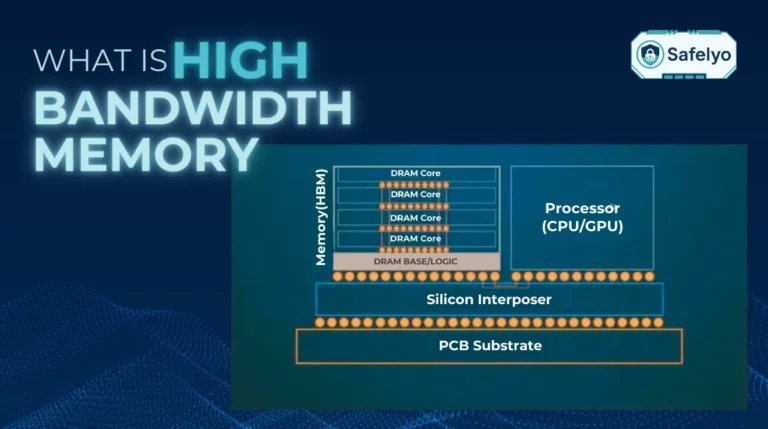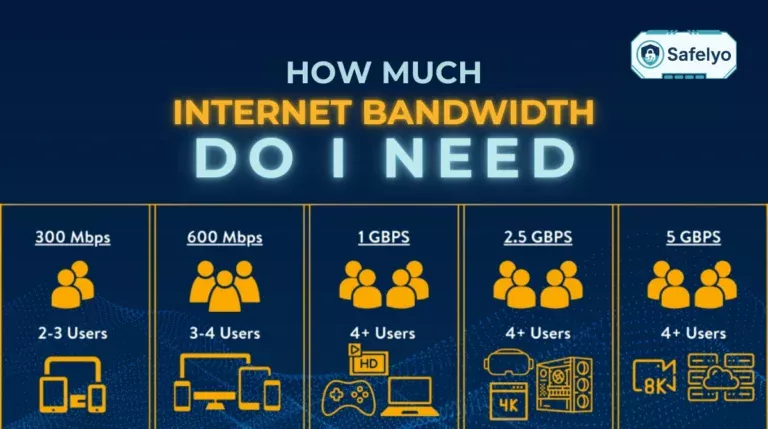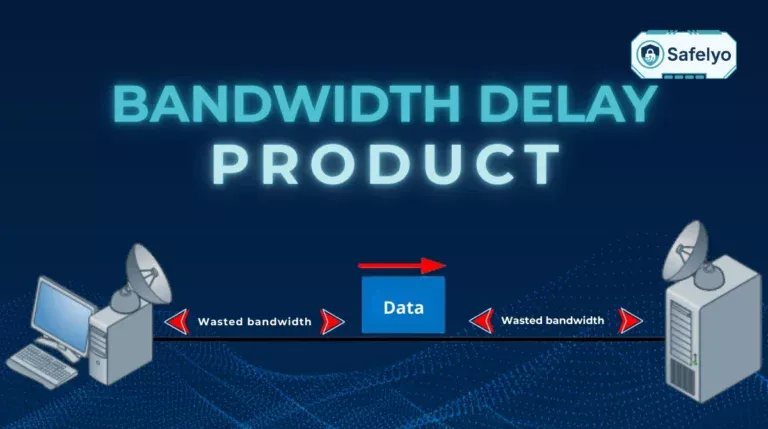If you’ve ever explored your VPN’s settings, you’ve likely seen a choice of “protocols” and a familiar name: OpenVPN. So, what is OpenVPN? Think of it as the trusted, battle-tested engine inside the armored truck that is your VPN service – the core technology that makes your secure connection possible.
In the complex world of cybersecurity, understanding the tools that protect you is essential. Is OpenVPN a company? A type of VPN? Or the technology that powers it? The distinction is crucial, as it helps you understand how your digital privacy is actually being protected.
As a security analyst who has configured and tested countless VPN connections, I’ve seen how OpenVPN stands as the bedrock of reliability. It may not always be the fastest option today, but its open-source, battle-tested security is why it remains a top choice for professionals and privacy advocates alike.
In this comprehensive guide, you’ll discover:
- The crucial difference between a VPN service and the OpenVPN protocol.
- How OpenVPN works to create a secure, encrypted tunnel.
- The practical difference between its two “dialects”: UDP and TCP.
- How does it compare to newer protocols like WireGuard?
Don’t just click ‘connect’ – understand the powerful technology working to protect you. Let me translate the world of VPN protocols into plain English, starting with the trusted original: OpenVPN.
1. VPN vs. OpenVPN: The delivery service vs. the engine
This is the single biggest point of confusion when people first hear about OpenVPN, and it’s the most important distinction to understand. As a security analyst, I’ve explained this difference countless times. The easiest way I’ve found to do it is to think of a global delivery company and the engine that powers its trucks.
1.1. A VPN Service
This is the complete package you pay for (e.g., NordVPN, ExpressVPN). Think of it as a global delivery company, similar to FedEx or DHL.
- They own the network of secure servers (the trucks and warehouses).
- They provide user-friendly apps for your devices (the drivers and tracking systems).
- They manage the entire end-to-end service to deliver your packages (your data) securely service is the company that provides the entire infrastructure and makes it easy for you to use.
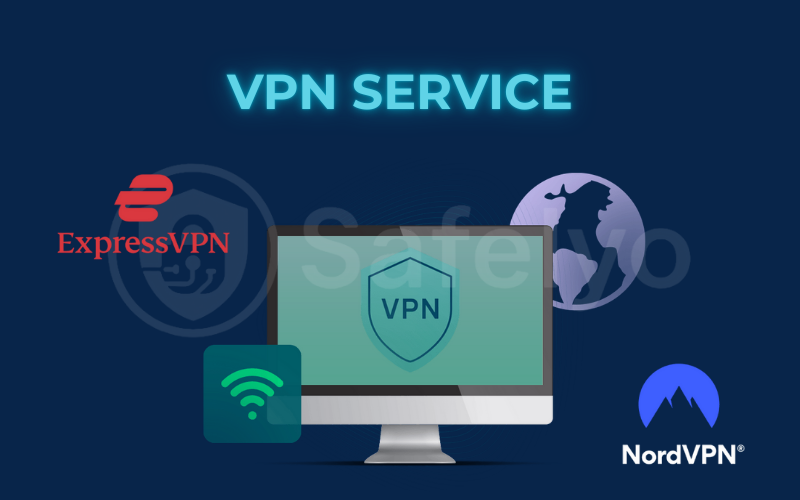
1.2. OpenVPN (The Technology/Protocol)
Now, OpenVPN is the powerful, reliable engine inside many of those delivery trucks.
- It’s the VPN protocol – the set of rules and instructions – that creates the secure, encrypted VPN tunnel.
- It’s a piece of open-source technology that many different VPN companies choose to build their services upon because it’s so secure and trustworthy.
The delivery company can choose which engine to use. They might use the battle-tested OpenVPN engine for reliability or a newer, faster engine like WireGuard. This is the core difference between a VPN and OpenVPN.
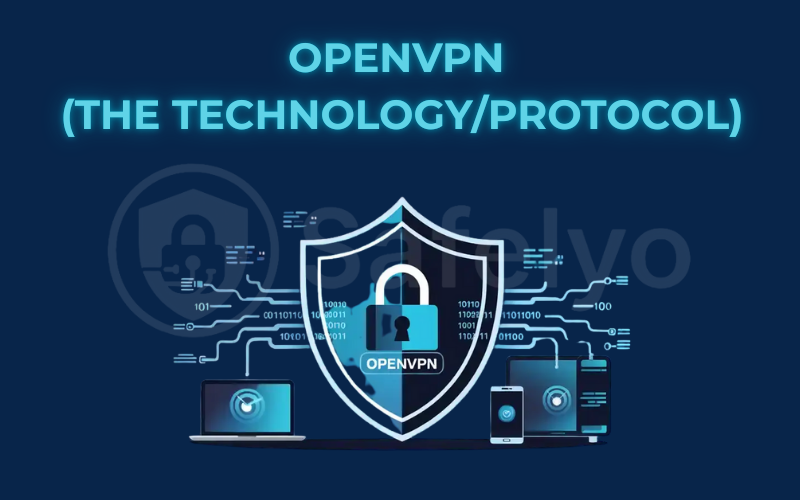
To put it simply, here’s a quick summary:
| Aspect | VPN Service (The Company) | OpenVPN Protocol (The Technology) |
| What It Is | A complete, user-ready service | The underlying technology or set of rules |
| Analogy | The entire delivery company (e.g., FedEx) | The engine inside the delivery truck |
| What You Get | A global network of servers, apps, and customer support | The software/code to create a secure tunnel |
| Cost | Typically, a paid subscription | The technology itself is free and open-source |
| Examples | NordVPN, ExpressVPN, Surfshark | OpenVPN, WireGuard, IKEv2 |
1.3. So, is OpenVPN free?
This is a great question, and the answer is yes, the technology itself is free. But what you pay for with a commercial VPN service is convenience and infrastructure.
The OpenVPN protocol is like a free, publicly available blueprint for a world-class engine. You could technically use that blueprint to build your own engine and car from scratch. But you’d still need to build the roads, map the routes, and learn to drive it yourself. Setting up your own private OpenVPN server is a highly technical task.
When you pay for a service, you’re essentially hiring them to do the work for you. They provide a fleet of thousands of “trucks” (VPN servers) around the world, ready to go at the click of a button.
2. How does OpenVPN work to protect you?
So, we know OpenVPN is the engine. But how does OpenVPN work to actually protect your data? At its core, it creates a secure, encrypted “tunnel” between your device (which runs an OpenVPN client) and a remote computer (the OpenVPN server).
Think of it as establishing a private, armored passageway through the public internet. Here’s a simplified breakdown of what happens in the blink of an eye when you hit the ‘Connect’ button:
Authentication (The Secret Handshake)
First, your device must prove to the server that it’s authorized to connect. At the same time, the server needs to verify its legitimacy to your device to ensure it’s not an imposter. They do this by exchanging digital certificates and secret keys, performing a sort of “secret handshake.” This entire process is secured using the highly respected SSL/TLS protocol. It’s the same technology that protects your connection when you see the padlock icon on HTTPS websites, like your online bank.
Tunneling (Building the Passageway)
Once the handshake is successful and both sides trust each other, a secure tunnel is established. From this point on, all your internet traffic – whether web browsing, streaming, or gaming – is routed through this private passageway. This keeps it secure instead of exposing it to the open internet.
Encryption (Scrambling the Contents)
This is the final layer of security. Everything that goes through the tunnel is scrambled using a powerful encryption cipher, typically the gold-standard AES-256. This means that even if a highly sophisticated attacker could somehow intercept your data in transit, all they would see is complete and utter gibberish. They wouldn’t have the secret keys needed to unscramble it.
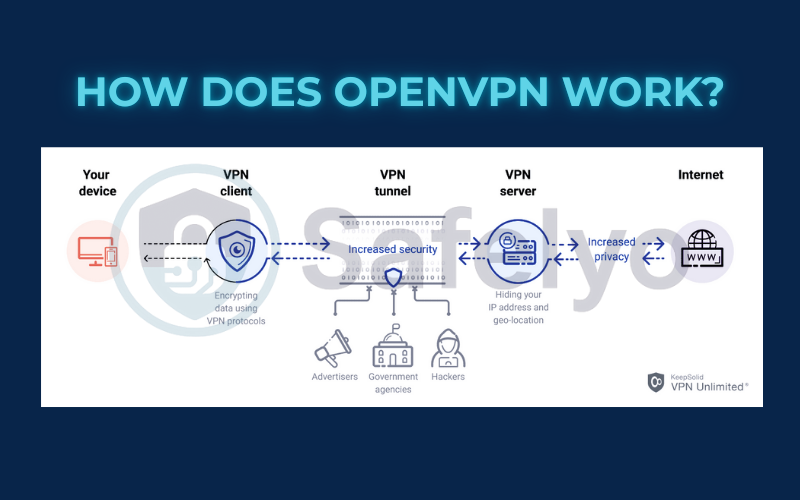
From my perspective as a security analyst, the true beauty of the OpenVPN protocol lies in its use of the OpenSSL library for handling these cryptographic functions. OpenSSL is one of the most rigorously tested, audited, and trusted cryptographic toolkits in the world. By building upon this foundation, OpenVPN isn’t just secure; it’s built on a legacy of proven security, making it an incredibly safe choice.
3. The two dialects of OpenVPN: UDP vs. TCP
One of the greatest strengths of the OpenVPN protocol is its flexibility. It can “speak” in two different ways, or dialects, depending on the task at hand. When you dig into your VPN’s settings, you’ll almost always see an option to choose between OpenVPN UDP and OpenVPN TCP.
As someone who constantly tests VPN performance, I can tell you that your choice here can have a huge impact on your experience. Making the right one is simple if you know what you’re trying to achieve. Use this simple decision guide to pick the right dialect for your needs.
| If you are… | You should choose… | Because you need… |
| Streaming 4K video or online gaming | OpenVPN UDP (usually the default) | Speed. UDP is the sprinter. It sends data packets as fast as possible without stopping to check if every single one arrived perfectly. For streaming, losing a single pixel in one video frame is unnoticeable, but speed is everything. |
| Accessing your online bank or sending an email | OpenVPN TCP | Reliability. TCP is the meticulous accountant. It’s a bit slower because it has a built-in error-checking system, guaranteeing that every single piece of your data arrives intact and in the correct order. This is essential for these tasks. |
| On an unstable network (hotel/airport Wi-Fi) | OpenVPN TCP | Stability. I switch to TCP all the time when I’m on the road. Its error-checking system is fantastic at maintaining a stable connection, even when the Wi-Fi is spotty and unreliable. |
| Trying to bypass a strict firewall (like at school or work) | OpenVPN TCP (on port 443) | Stealth. This is OpenVPN’s secret weapon. TCP traffic on port 443 is configured to look exactly like the normal, secure traffic from an HTTPS website. This makes it incredibly difficult for most firewalls to detect and block your VPN. |
The bottom line on OpenVPN UDP vs TCP:
Start with UDP for the best performance. If your connection feels unstable or you can’t get through a firewall, switch to TCP. It’s that simple.
4. OpenVPN vs. WireGuard: The classic vs. the challenger
For over a decade, OpenVPN was the undisputed king of VPN protocols, the heavyweight champion of security and reliability. But in recent years, a serious challenger has entered the ring: WireGuard. This has sparked the biggest debate in the VPN community: OpenVPN vs WireGuard, which is truly better?
As someone who tests both protocols extensively, I can tell you there isn’t one simple answer. It’s a classic case of a trusted veteran versus a modern speedster, each with unique strengths.
4.1. OpenVPN (The Time-Tested Veteran)
Think of OpenVPN as a legendary, heavy-duty military vehicle. It’s built to handle any terrain and has been battle-hardened over two decades.
PROS
Its security is beyond question, thanks to years of scrutiny by the open-source community. It’s incredibly flexible (with its UDP/TCP modes) and is the undisputed champion at bypassing restrictive firewalls.
CONS
Its design is older and more complex, with a much larger codebase. This can result in slightly slower speeds and higher battery consumption compared to newer options.
4.2. WireGuard (The Modern Speedster)
Think of WireGuard as a sleek, modern Formula 1 car. It was designed from the ground up for one thing: Blistering speed and efficiency.
PROS
It is significantly faster than OpenVPN, often providing a near-native internet speed experience. Its codebase is incredibly small and simple, making it easier to audit and more efficient on mobile devices.
CONS
It’s less flexible than OpenVPN, primarily using UDP, which makes it easier to block on some networks. As a newer protocol, it has been in the public eye for a shorter period, though its modern cryptography is considered top-notch.
To make it even clearer, here’s a direct comparison:
| Feature | OpenVPN (The Veteran) | WireGuard (The Speedster) |
| Primary Strength | Reliability & Flexibility | Speed & Simplicity |
| Codebase | Heavy (~70,000+ lines) | Lightweight (~4,000 lines) |
| Best for Bypassing Firewalls | Excellent (using TCP on port 443) | Good |
| Battery Life on Mobile | Good | Excellent |
| Verdict | The trusted, all-terrain workhorse | The high-performance racer |
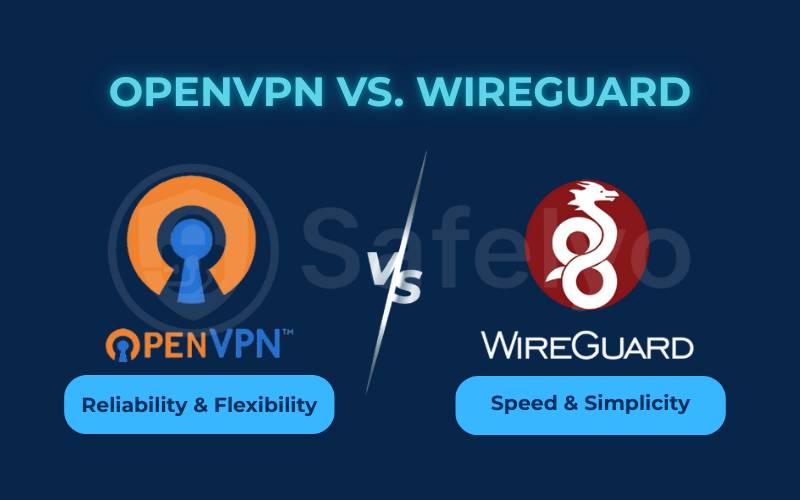
So, which should you choose?
- For pure speed in everyday browsing and streaming, WireGuard often has the edge.
- However, OpenVPN remains the gold standard for reliability, compatibility, and its unmatched ability to work on restrictive networks.
The best VPN providers know this, which is why they now offer both, giving you the best of both worlds.
5. Is OpenVPN safe, and should you use it in 2025?
After comparing OpenVPN to newer protocols, two critical questions remain: Is it still safe, and should you still be using it today?
Is OpenVPN safe?
Let me be unequivocal: Yes, OpenVPN is extremely safe. In the world of cybersecurity, an open-source history spanning more than 20 years is a badge of honor.
- Community Scrutiny: Its code has been publicly available for decades, meaning thousands of independent security experts, academics, and privacy advocates have inspected, audited, and attempted to break it. This continuous, global scrutiny is far more rigorous than any internal audit a private company could conduct.
- Proven Cryptography: When implemented correctly by a reputable VPN provider, it is considered one of the most secure VPN protocols. It uses strong encryption like AES-256 and leverages the OpenSSL library.
From my professional standpoint, I trust a properly configured OpenVPN connection without hesitation. Its security is not in question.
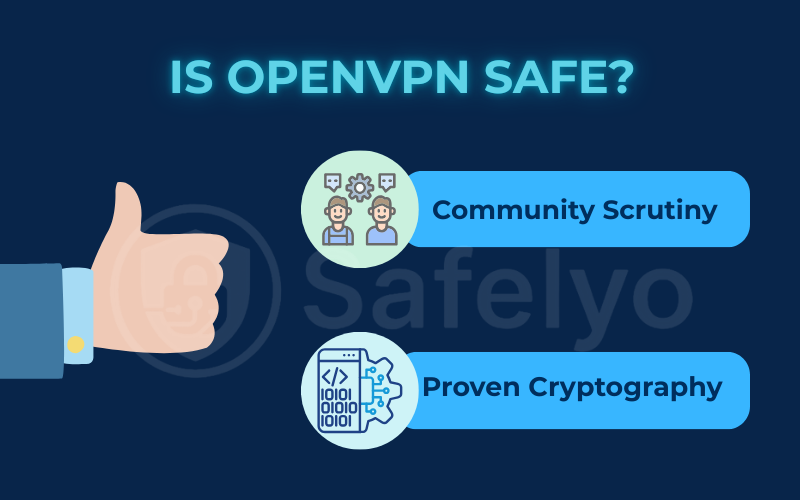
Should you use it?
Absolutely. While WireGuard is an exciting development and often my first choice for speed, OpenVPN is far from obsolete. In fact, it’s still the superior choice in several common scenarios:
- For bypassing censorship: OpenVPN’s ability to use TCP on port 443 makes it the master of disguise, allowing it to slip through restrictive firewalls that might block other protocols.
- For maximum stability: If you’re on a choppy hotel Wi-Fi or a spotty mobile connection, OpenVPN’s TCP mode is more resilient and will work harder to keep your connection alive.
- For peace of mind: Its long, proven track record provides a level of trust that, for some, newer protocols have yet to fully earn.
The good news is you often don’t have to choose. Most top VPN apps now have an “Automatic” protocol setting. In my experience, this setting is incredibly smart. It will typically default to a faster protocol like WireGuard when possible, but will automatically switch to the reliable OpenVPN protocol if it detects a more challenging network environment. It’s the best way to get speed when you can, and reliability when you need it.
Safelyo’s Expert Insight:
The Power of “Open Source”
In the world of cybersecurity, “open source” is a badge of honor. It means that the software’s underlying code is public for anyone to inspect, audit, and test for vulnerabilities. For a security protocol like OpenVPN, this is critical.
Its code has been scrutinized by thousands of independent experts for over two decades, creating a level of trust that proprietary, closed-source software can never fully achieve. When you use OpenVPN, you’re not just trusting a company; you’re trusting a global community of security professionals.
6. FAQ about OpenVPN
We’ve covered the engine, the dialects, and the challengers. Here are some quick, direct answers to the most common questions people ask about the OpenVPN protocol.
What is OpenVPN?
OpenVPN is a highly secure, open-source technology or protocol that is used to create a safe, encrypted connection over the internet. It is not a VPN company itself, but rather the powerful “engine” that many of the best VPN services use to power their connections.
What is the difference between VPN and OpenVPN?
The difference between VPN and OpenVPN is simple: a VPN is the complete service you subscribe to (like a delivery company with trucks, drivers, and warehouses). OpenVPN is the specific protocol, or technology, used to run the connection (like the engine inside the truck).
Is it safe to use OpenVPN?
Yes, OpenVPN is considered extremely safe. Its open-source code has been publicly audited for over 20 years, and it uses industry-standard encryption like AES-256 and the trusted OpenSSL library. When configured correctly, it is one of the most secure VPN protocols available.
Is OpenVPN free to use?
Yes, the OpenVPN technology itself is free. You can download the open-source software and, if you have the technical skill, set up your own OpenVPN server. However, most people pay for a commercial VPN service that uses the OpenVPN protocol, which gives them access to a global network of servers and easy-to-use apps.
What VPN uses OpenVPN?
Nearly all major VPN providers use OpenVPN. Top-tier services like NordVPN, ExpressVPN, Surfshark, and CyberGhost all offer OpenVPN as a core protocol option in their apps, often alongside newer protocols like WireGuard.
Is OpenVPN better than IPsec?
The OpenVPN vs IPsec debate often comes down to flexibility. OpenVPN is generally considered more versatile and better at bypassing firewalls because it can be configured to run over any port, including TCP port 443, to mimic HTTPS traffic. IPsec can sometimes be faster as it’s often built into the operating system, but it can be easier for network administrators to block.
Where do I find the OpenVPN settings in my VPN app?
Check for a “Settings,” “Connection,” or “Protocol” tab in your VPN app’s menu. You will typically find a dropdown list where you can select from options such as “Automatic,” “OpenVPN (UDP),” “OpenVPN (TCP),” and “WireGuard.”
7. Conclusion
In the world of secure digital languages, OpenVPN is the trusted, versatile, and battle-hardened classic that forms the backbone of the modern VPN industry. While no longer the only engine on the market, its legacy of security and reliability is unmatched.
- OpenVPN is a protocol – the technology that creates the secure tunnel, not the VPN service itself.
- It’s extremely secure and trustworthy thanks to its open-source nature and long, proven history.
- Choose UDP for speed (streaming/gaming) and TCP for reliability (unstable networks/firewalls).
- While WireGuard is faster, OpenVPN remains a vital and often superior choice for specific situations.
Understanding what OpenVPN is empowers you to make smarter choices in your VPN’s settings, ensuring you’re always using the best tool for the job.
In all of the top-rated VPNs, Safelyo offers OpenVPN as a core option. Explore our comprehensive Best VPN reviews and our Privacy & Security Basics section to see how each provider implements this powerful and trusted protocol.


